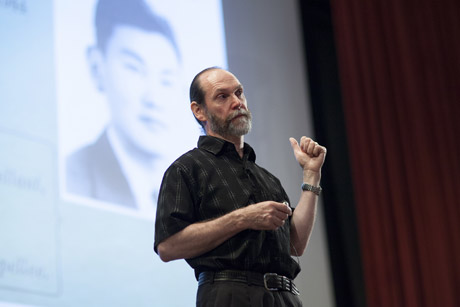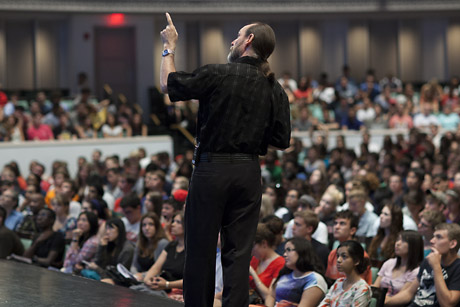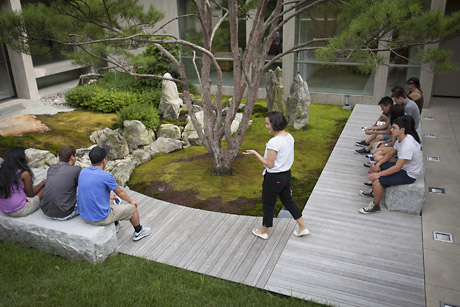WWII-like human rights violations persist, says expert
By Abigail Warren


Although fall semester classes had yet to begin, new students were already exploring racism, politics and human rights.
Matthew Evangelista, the President White Professor of History and Political Science in the Department of Government, who teaches international and comparative politics, gave one of the three “Cornell Contexts” lectures Aug. 25 based on Julie Otsuka’s novel “When the Emperor Was Divine,” the 2013 New Student Reading Project book. Small group discussions of the novel were held across campus Monday, Aug. 26.
The book tells the story of a Japanese-American family’s experiences in an internment camp during World War II. In his presentation on “Human Rights at War,” Evangelista described the mass relocation of these citizens as an “unprecedented catastrophe” for the individuals affected, but he drew comparisons to similar historical and modern-day wartime human-rights violations.
Evangelista said that the internment of Japanese-Americans was deemed legal at the time and, like most other mass relocations of citizens, was carried out “on the basis of national security concerns.”
He posed the question of whether the U.S. legal system is one considered as “rule of law” or “rule by law” – the latter being a system of law that risks undermining a nation’s values in the pursuit of security.
Executive Orders 9066 and 9102 typified “rule by law” and, in conjunction with the Alien Enemies Act of 1798, were the legal basis for the internment of more than 100,000 Japanese-Americans, he said.
Even when the law was challenged in 1944 by California-born Japanese-American citizen Fred Korematsu (1919-2005) in Korematsu v. United States, the U.S. Supreme Court ruled that internment was necessary because it was “impossible to bring about an immediate segregation of the disloyal from the loyal.” Decades later, Korematsu spoke out as a civil rights advocate and was awarded the Presidential Medal of Freedom, the nation’s highest civilian honor, in 1998. Congress apologized for the mass internment and offered token compensation to the families that had suffered.
Evangelista related the internment of Japanese-Americans to the Russian mass relocation of Russian-Chechens, who “Stalin accused of disloyalty and shipped to the East”; he also cited the Palmer Raids of 1920 as another wartime abuse of citizens’ rights, when “people were arrested for their beliefs, particularly their anti-war beliefs.”
While Americans today may consider such events isolated in history, Evangelista drew comparisons to recent incidents of U.S. government discrimination against Muslims. As part of America’s “War on Terror,” he said, people were stripped of their rights and held in indefinite detention at Guantanamo Bay military prison, which, Evangelista notes, “some people have characterized … as a concentration camp.”
Abuses at Guantanamo and the arrest of thousands of Arab and Muslim residents of the United States, often on minor immigration violations, call into question how much progress we’ve made toward transparent and fair wartime human rights policies, he said.
Today, “because the nature of foreign policy is secretive, citizens don’t know how to judge the policies their countries engage in,” Evangelista said, citing James Madison’s reaction to the Alien Enemies Act.
He concluded with Korematsu’s assertion from 2004 that current American policies “can make you worry that these are very dangerous times for our democracy.”

Other “Cornell Contexts” events included “Imaging Intolerance: Cultural Differences and Civil Liberties,” at the Herbert F. Johnson Museum of Art; “Beyond Words: Images From America’s Concentration Camps,” based on two recent graduates’ research on internment camp, at the Cornell University Library; a discussion at Cornell Cinema of “The Cats of Mirikitani,” a 2001 documentary on Japanese-American artist and former internee Jimmy Mirikitani; and lectures by history professor Derek Chang on internment, white supremacy and nationalism; and by English and Asian-American studies professor Shelley Wong on what the experience and memory of internment can teach us.
Abigail Warren ’15 is a writer intern for the Cornell Chronicle.
Media Contact
Get Cornell news delivered right to your inbox.
Subscribe